
Anna Maria of Mecklenburg-Schwerin was a German noblewoman, a member of the House of Mecklenburg and by marriage Duchess of Saxe-Weissenfels.

Magdalena Sibylle, Duchess of Saxe-Weissenfels was a German noblewoman.

Frederick II, Duke of Saxe-Gotha-Altenburg, was a duke of Saxe-Gotha-Altenburg.

Frederick I, Duke of Saxe-Gotha-Altenburg, was a duke of Saxe-Gotha-Altenburg. He was born in Gotha, the fourth but eldest surviving son of Ernst I, Duke of Saxe-Coburg-Altenburg and Elisabeth Sophie of Saxe-Altenburg.

Frederick III, Duke of Saxe-Gotha-Altenburg, was a duke of Saxe-Gotha-Altenburg.

Johann Georg I, Duke of Saxe-Eisenach was the fifth but third surviving son of Wilhelm, Duke of Saxe-Weimar and Eleonore Dorothea of Anhalt-Dessau.
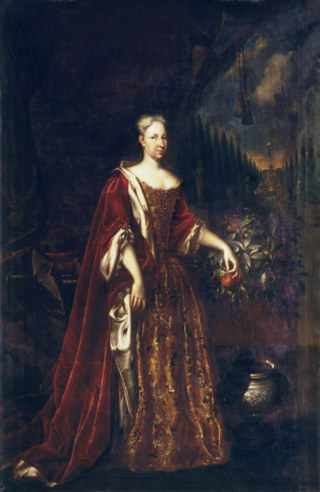
Princess Magdalena Augusta of Anhalt-Zerbst was, by birth, a Princess of Anhalt-Zerbst and, by marriage, a Duchess of Saxe-Gotha-Altenburg. She was the maternal grandmother of George III of the United Kingdom.

Augustus of Saxe-Weissenfels, was a Duke of Saxe-Weissenfels-Querfurt of the House of Wettin and administrator of the Archbishopric of Magdeburg.

Johann Georg, was Duke of Saxe-Weissenfels from 1697 until his death.
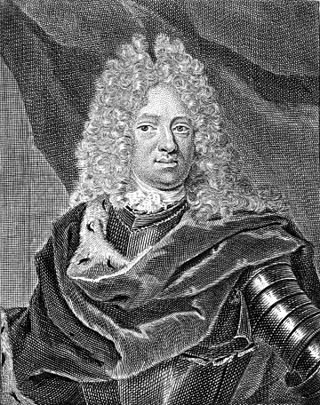
Christian was Duke of Saxe-Weissenfels from 1712 until his death.

Johann Adolf II was the last Duke of Saxe-Weissenfels from 1736 to 1746. Following his death without surviving male issue, the Duchy returned to Electoral Saxony. Johann Adolf was also a commander in the Saxon Army.

Louise of Saxe-Gotha-Altenburg was Duchess of Mecklenburg-Schwerin through her marriage to Grand Duke Frederick Francis I.

Magdalene Sibylle of Saxony, in Denmark known as Magdalena Sibylla, was the Princess of Denmark and Norway from 1634 to 1647 as the wife of Prince-Elect Christian of Denmark, and the Duchess consort of Saxe-Altenburg as the wife of Frederick Wilhelm II, Duke of Saxe-Altenburg.

Princess Charlotte of Saxe-Meiningen was a member of the House of Saxe-Meiningen and a Princess of Saxe-Meiningen by birth and a member of the House of Saxe-Gotha-Altenburg and Duchess consort of Saxe-Gotha-Altenburg through her marriage to Ernest II, Duke of Saxe-Gotha-Altenburg.
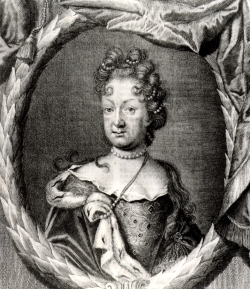
Sophia of Saxe-Weissenfels was a member of the Albertine branch of the House of Wettin, and a princess of Saxe-Weissenfels and Querfurt by birth and by marriage Princess of Anhalt-Zerbst.

Johanna Magdalena of Saxe-Altenburg was a member of the House of Wettin. She was a Duchess of Saxe-Altenburg by birth and by marriage a Duchess of Saxe-Weissenfels-Querfurt.
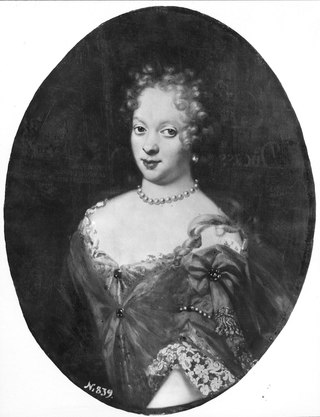
Elisabeth of Mecklenburg-Güstrow, was a German noblewoman member of the House of Mecklenburg and by marriage Duchess of Saxe-Merseburg-Spremberg and Saxe-Merseburg.

Fredericka Elisabeth of Saxe-Eisenach, was a German noblewoman member of the House of Wettin and by marriage Duchess of Saxe-Weissenfels.
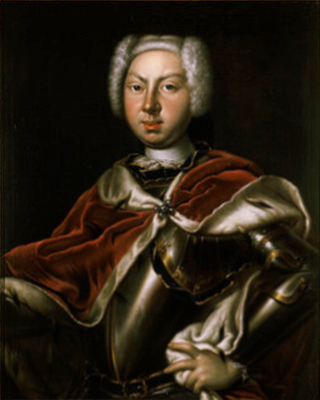
Prince William Charles Christian of Saxe-Gotha-Altenburg was a German prince of the Saxe-Gotha-Altenburg house, a junior line of the Ernestine Wettins. He served as a Generalfeldzeugmeister in the armies of the Holy Roman Empire.



















